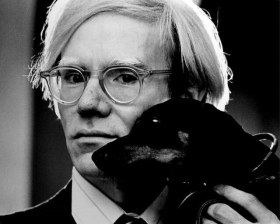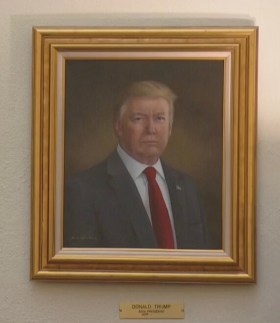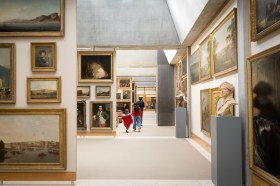Between October 3 – 4, at the Holographic Center for the Arts, Long Island City, New York, I had the good fortune of making a nine metre pulse laser hologram titled, I Dreamt We Had Something To Say.
I was assisted by Ana Nicholson, Director, Sam Moree and Martina Mrongovius. The broader theme addresses how readily mobile phones have become an apparent necessity in our lives. The deeper issues concern the impact they have.
The project resulted from six months of intense preparations which were often on a par with starting a lawnmower without petrol. Eventually the problems were solved and a special recording camera and film processing rig that would facilitate the production of a long film based hologram were made. The final laser hologram displays thirty self portraits each 25 x 35cm and all showing the use of a mobile phone. They are lit with thirty red diode lasers. Final installation will also include hearing typical mobile phone conversations that were recorded on a CD.
The most obvious impact of this technology, besides one ear becoming flatter than the other, is the way it seduces us into ‘never leaving home without it’. It has become a ‘badge of companionship’ …”look at me I have a mobile phone therefore I have friends; people who want to talk to me and send messages and with whom I am eager to communicate back”.
Conversely we won’t mention the way it has evolved as the ultimate ‘no show and dump the relationship’ gizmo. Interestingly it has encouraged the establishment of shorthand text which came about in the early days when text messaging was limited by the number of letters/gaps you could use. While this restriction no longer exists, the new ‘txt’ has become accepted vocabulary and even spawned a host of books to help those decipher or use it. But perhaps the most surprising aspect is the enormous cost that people are willing to pay; and not forgetting the cost to the community and environment with towers that randomly dot the landscape like musical notes on a score sheet.
And finally there is that look; someone texting with a thumb that looks like a piston in a formula one car while, with extra sensory perception, dodging doors, poles and other people who themselves will probably be texting, talking on their phone or simply wearing a fixated stare with spaghetti like threads hanging from their ears. So I had a contemporary theme for making the artwork.
On a practical level holographic film is available in ten metre lengths and I already had experience in making large scale holograms on numerous occasions. While much of my previous holograms had imagery that related to the many countries visited, of late I have become fascinated with personal technology and how fervently people have embraced it. Also, the advent of laser diode technology meant that it became feasible to illuminate such a large multi imaged hologram which previously would have required splitting a laser beam with small sheets of glass or mirrors into many separate beams; cheap diodes have introduced a more convenient way of achieving the same result.
So what am I saying with this work? Put simply, my personal impressions are that more often than not mobile phone use has become a classic example of technology being used for technologies sake; which in itself does not mean it is a bad thing but it has become a fertile ground for reflection.
It is certainly the commercial success of the century… ‘you need to communicate, you can’t afford to be out of reach, how would you feel if your daughter was caught alone at night and unable to contact her?’
Fear is a wonderful thing; just ask any manufacturer of airport security scanners. But let’s be honest, conversations are often trivialised to the point of annoyance; “I’m just letting you know that we have nothing more to say to each other.” “Hi, what are you doing?”, “I haven’t heard from you for over an hour. Is something wrong?”
I fear that meaningful conversations are going the way of the tourist feeding peanuts to the monkeys in Antarctica.
  |
  |
Some examples of David’s work
a) Inital drying of the hologram
b) A few of the portraits included in I Dreamt We Had Something to Say
c) Images of the two one metre square holograms made at Holographic North in Burlington Vermont last week. The first is also on the theme of mobile phones
d) The second is on the theme of PC/Xbox gaming.
They are called stereograms and these are different in that they are animated and have text appear as the viewer walks past them. One is also on the theme of mobile phones and the other is on the theme of PC/Xbox gaming.
Note: Works may not appear sharp in the images as holograms are very difficult to photograph.



_Encounters-in-Reflection_Gallery3BPhoto-by-Anpis-Wang-e1745414770771.jpg?w=280)
